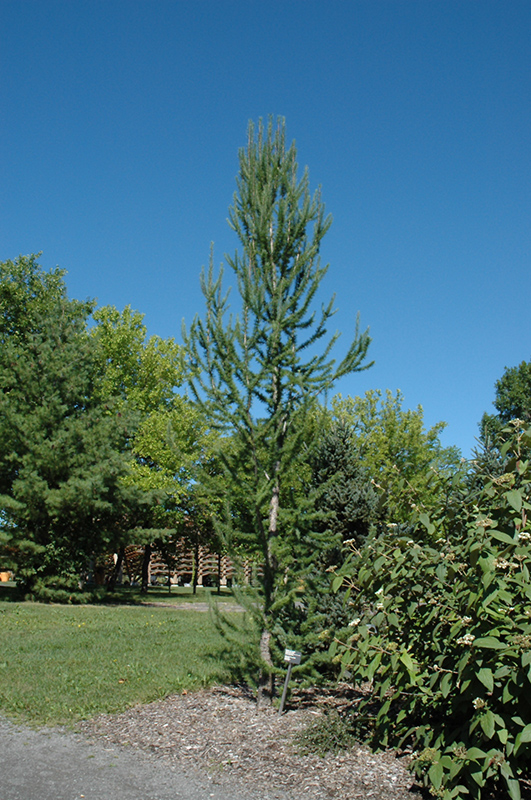Plant Search Tool
This is a 3rd party Knowledgebase and does not reflect actual stock
Jacobsen's Pyramid Japanese Larch
Larix kaempferi 'Jacobsen's Pyramid'
Height: 15 feet
Spread: 6 feet
Sunlight:
![]()
![]()
Hardiness Zone: 4a
Description:
This unique variety has soft green needles that change to a stunning golden yellow in the fall, on a narrow, loosely columnar habit; in winter, red-brown bark covered with short spurs is revealed; an interesting addition to the landscape composition
Ornamental Features
Jacobsen's Pyramid Japanese Larch is primarily valued in the landscape for its rigidly columnar form. It has rich green deciduous foliage which emerges light green in spring. The needle-like leaves turn an outstanding gold in the fall. The rough brick red bark is extremely showy and adds significant winter interest.
Landscape Attributes
Jacobsen's Pyramid Japanese Larch is a multi-stemmed deciduous shrub with a narrowly upright and columnar growth habit. It lends an extremely fine and delicate texture to the landscape composition which can make it a great accent feature on this basis alone.
This is a relatively low maintenance shrub, and should not require much pruning, except when necessary, such as to remove dieback. Deer don't particularly care for this plant and will usually leave it alone in favor of tastier treats. It has no significant negative characteristics.
Jacobsen's Pyramid Japanese Larch is recommended for the following landscape applications;
- Accent
- General Garden Use
- Container Planting
Planting & Growing
Jacobsen's Pyramid Japanese Larch will grow to be about 15 feet tall at maturity, with a spread of 6 feet. It tends to fill out right to the ground and therefore doesn't necessarily require facer plants in front, and is suitable for planting under power lines. It grows at a slow rate, and under ideal conditions can be expected to live for 50 years or more.
This shrub does best in full sun to partial shade. It is quite adaptable, prefering to grow in average to wet conditions, and will even tolerate some standing water. It is not particular as to soil type, but has a definite preference for acidic soils. It is quite intolerant of urban pollution, therefore inner city or urban streetside plantings are best avoided. Consider applying a thick mulch around the root zone in winter to protect it in exposed locations or colder microclimates. This is a selected variety of a species not originally from North America.
Jacobsen's Pyramid Japanese Larch makes a fine choice for the outdoor landscape, but it is also well-suited for use in outdoor pots and containers. Its large size and upright habit of growth lend it for use as a solitary accent, or in a composition surrounded by smaller plants around the base and those that spill over the edges. It is even sizeable enough that it can be grown alone in a suitable container. Note that when grown in a container, it may not perform exactly as indicated on the tag - this is to be expected. Also note that when growing plants in outdoor containers and baskets, they may require more frequent waterings than they would in the yard or garden. Be aware that in our climate, most plants cannot be expected to survive the winter if left in containers outdoors, and this plant is no exception. Contact our experts for more information on how to protect it over the winter months.






